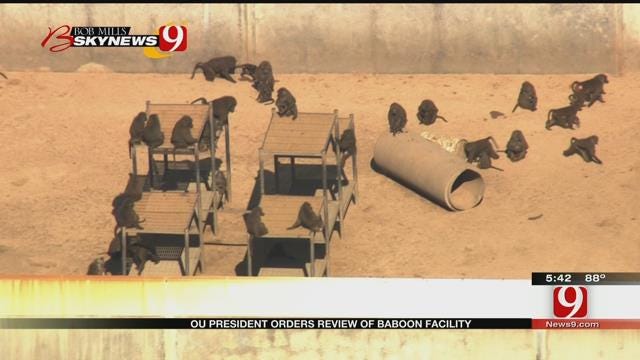OU President Orders Review Of Baboon Breeding Program
The University of Oklahoma is investigating itself, after a News 9 story was aired in July. OU President David Boren has ordered a full internal review of the program.Sunday, August 2nd 2015, 5:57 pm
The University of Oklahoma is investigating itself after a News 9 story was aired in July.
Last month, News 9 showed viewers a colony of baboons under the university's care near El Reno. On Sunday, OU President David Boren has ordered a full internal review of the program.
“They're baboons but they're also Oklahomans,” primatologist Bob Ingersoll said.
A colony of baboons born and bred right here in Oklahoma and living at a facility in El Reno are used for biomedical and behavioral research at labs throughout the United States.
7/4/2015 Related Story: Baboons Bred In Oklahoma As Resource For Research
“They didn't do anything to deserve what's going on,” Ingersoll said.
Ingersoll rescues primates after their time in research to bring them to sanctuaries like Mindy’s Memory in Newcastle.
“Captivity is really the enemy. Once you bring a primate into this world, in captivity, it's pretty much in captivity for the rest of its life,” he said.
The Fort Reno Science Park where the baboons are bred has operated since 2001 and, at last check in January 2015, 358 baboons live in the facility.
But the program has faced criticism lately from some animal rights groups following the deaths of several young baboons and inspection reports citing OU for not complying with the federal animal welfare act.
7/6/2015 Related Story: Watchdog Group Files Complaint Against OU Over Baboon Deaths
Due to the public interest of the facility, Boren ordered a review into the program.
In an email to News 9, program spokesperson James Tomasek wrote “President Boren asked for an examination focusing on three factors: the alignment of the baboon program with our newest research strategic plan, keeping in mind that our research initiatives have changed since the baboon program began; the resources required to ensure ongoing compliance of the program with USDA rules and regulations; and the financial sustainability of the program with declining or uncertain federal research funding.”
While Ingersoll is against animal testing of any kind, he still works with the labs to rescue the ones he can.
“These are sentient beings,” Ingersoll said. “They have families they should have the opportunity to have a life, even if we're going to do research on them, they should at some point have an opportunity to have a life.”
As far as the deaths of young baboons at the facility, Tomasek said in a statement “Similar to their natural environment in the wild, deaths occur in the colony, particularly deaths of newborns and infants due to accidents and/or aggressive adult baboon behavior.”
7/7/2015 Related Story: OU Official Responds To Complaint Over Baboon Deaths
Tomasek said the animals are being treated humanely, adding “OU has never been charged with violating the Animal Welfare Act. The most recent USDA Inspection Report states that 'no non-compliant items were identified during this inspection' of the OU Health Sciences Center Animal Care and Use Program. OU is confident that it has in place the necessary and appropriate safeguards to promote an ethical, humane, and compliant research program.”
The program operates through grants from the National Institutes of Health.
More Like This
August 2nd, 2015
September 29th, 2024
September 17th, 2024
Top Headlines
December 15th, 2024
December 15th, 2024
December 14th, 2024













